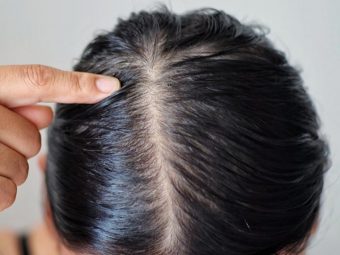4 Benefits Of Canola Oil For Hair And How To Apply It
This plant-based oil is a great alternative to many hair care products due to its composition.

Canola oil gained importance as a cost-effective and flexible cooking oil. However, many claim that it also provides numerous benefits for hair. Here, we will be looking into these claims about the potency of canola oil for hair growth and health. This vegetable oil is extracted from canola seeds.
According to studies, canola oil contains healthy proteins, vitamins, and fats (1). These nutrients provide many benefits to health. It is also claimed to moisturize the hair, reduce inflammation, and stimulate hair growth. However, all these benefits are backed by anecdotal evidence, and research in this regard is limited. In this article, we will dig deep into these claims and other aspects of canola oil. Keep reading.
In This Article
What Is Canola Oil?
Canola oil is derived from the canola seed, a genetic variation of the rapeseed developed by scientists in Canada. The name “canola” comes from “Canada” and “ola” (meaning oil). This vegetable oil is primarily used for cooking, and most of the crops are genetically modified to improve the health benefits of the oil. Canola oil is rich in (1):
- Saturated fat
- Monounsaturated fat
- Polyunsaturated fat
- Vitamin E
- Vitamin K
- Oleic acid (C18:1)
- Linoleic acid (C18:2)
- ALA (C18:3)
Canola oil has low levels of saturated fat (only 7%) and is considered one of the healthiest cooking oils available today. But does that mean it is safe to use on your hair? Let us find out.
Is Canola Oil Good For Your Hair?
While the evidence for this is purely anecdotal, canola oil is said to be incredibly moisturizing and comes with a host of hair health benefits. A few of them are as follows:
1. Reduces Inflammation
Anecdotal evidence suggests that the fats and acids in canola oil can soothe the skin and promote cell production. Thus, applying canola oil on your scalp may relieve itching and irritation and stimulate hair growth.
2. Hydrates The Hair And Prevents Water Loss
Beauty bloggers claim that canola oil is good for hair because of its moisturizing and nourishing properties. The oil coats the hair strands to lock in moisture. This prevents issues like frizzy hair, split ends, and dandruff.
3. Promotes Hair Growth
Canola oil contains vitamin E, an antioxidant that promotes hair growth. Consuming vitamin E minimizes oxidative stress on the scalp and promotes hair growth (2). Applying canola oil to your hair may rejuvenate your tresses and improve shine.
4. Reverses Hair Damage
Canola oil moisturizes and softens the hair strands. The antioxidants present in the ingredient can purify your hair and prevent dryness and UV damage.
Now that you know the benefits of canola oil for hair, here is how you can use it.
How To Apply Canola Oil On Hair
You can apply canola oil directly to the hair or mix it with other oils. Here are a few application methods you can try:
1. Heat Method
- Heat the canola oil and let it cool down a bit.
- Massage the scalp and hair with the warm canola oil for 10-15 minutes.
- Cover the hair with a towel or shower cap.
- After 30 minutes, wash out the canola oil with cold water or shampoo.
2. Coconut Oil And Canola Oil Hair Mask
Canola and coconut oils can help strengthen your locks. Coconut oil has antibacterial, anti-inflammatory, and moisturizing properties and soothes the skin (3).
To prepare a coconut oil and canola oil hair mask:
- Mix one cup each of coconut and canola oils.
- Gently massage your scalp with the oil blend.
- Leave the hair mask on for 30 minutes.
- Use a mild shampoo to wash the oil off.
- Repeat every week.
3. Canola And Almond Oils Pre-Shampoo Hair Mask
If you notice dark patches along your hairline, add almond oil to your canola oil hair mask. It prevents structural damage caused by UV radiation and also has emollient properties (4). This can help keep the hair moisturized and soft.
To use the almond and canola oils mask:
- Mix equal quantities of canola and almond oils.
- Section your hair and massage the scalp and hair with the oil mix.
- Leave it on for 1-2 hours.
- Rinse it off with a mild shampoo.
Canola oil is a nutrient-dense oil that is commonly used in cooking. Anecdotal evidence suggests that using canola oil for your hair may hydrate it, reduce scalp inflammation, and promote hair growth. You can apply canola oil either directly or use household ingredients such as coconut oil or almond oil to make hair masks at home. Canola oil is a versatile and affordable alternative to many oils. However, conduct a patch test before using it, and stop using it immediately if you experience any adverse reactions.
Frequently Asked Questions
Does Canola oil penetrate the hair shaft?
Yes. Canola oil has a light texture and can easily penetrate the hair shaft.
Is coconut oil better than canola?
Yes. Coconut oil is better than canola oil as it prevents protein (keratin) loss from the hair shafts, locks in moisture, strengthens the strands, and reduces hair breakage. Coconut oil is especially beneficial for reviving dry and damaged hair.
Is canola oil good for low porosity hair?
Yes. Canola oil is great for low porosity hair because it is lightweight and will not weigh the hair down. Also, its high fatty acid content can nourish and strengthen low porosity hair.
Are canola oil and rapeseed oil the same?
Yes. Canola is a genetically modified and highly processed version of rapeseed. Rapeseed oil has up to 54% erucic acid, which is fit for industrial use, and canola oil (processed rapeseed oil) must have an erucic acid level of 2% or below to be used as a cooking oil.
How can you tell if canola oil is pure?
Pure canola oil has a pale yellow, almost transparent color.
Key Takeaways
- Canola oil, with its healthy fats and protein content, can benefit hair growth.
- It helps nourish and moisturize your hair when used with coconut or almond oils.
- While there is no scientific evidence to back this, anecdotal evidence supports canola oil’s benefits in hair care.
Sources
- Evidence of health benefits of canola oil
https://www.ncbi.nlm.nih.gov/pmc/articles/PMC3746113/ - Effects of Tocotrienol Supplementation on Hair Growth in Human Volunteers
https://www.ncbi.nlm.nih.gov/pmc/articles/PMC3819075/ - In vitro anti-inflammatory and skin protective properties of Virgin coconut oil
https://www.sciencedirect.com/science/article/pii/S2225411017300871 - Anti-Inflammatory and Skin Barrier Repair Effects of Topical Application of Some Plant Oils
https://www.ncbi.nlm.nih.gov/pmc/articles/PMC5796020/












